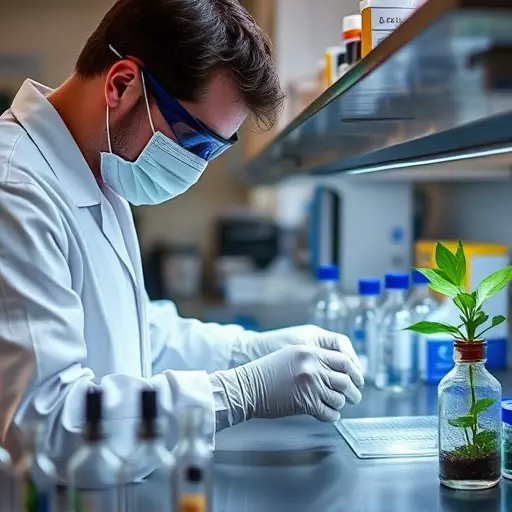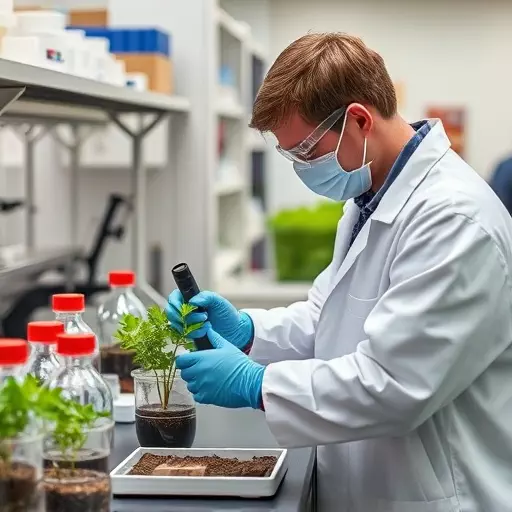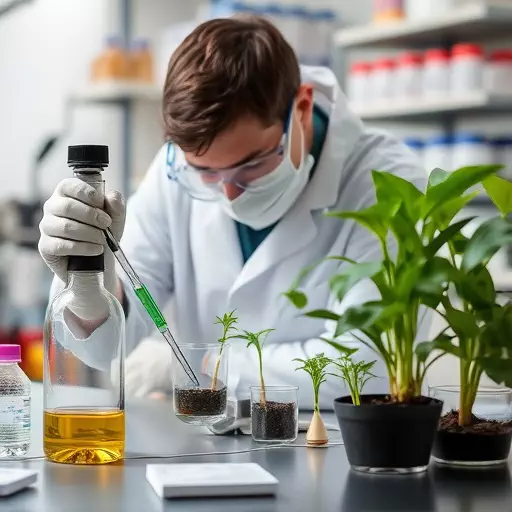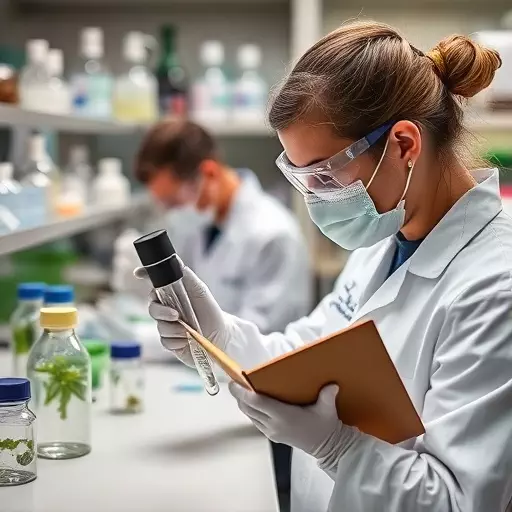Agricultural labs in Warren-Troy-Farmington Hills and beyond are driving sustainability through innovative forensic techniques. By applying methods originally used in crime investigation, like isotope analysis, these labs provide farmers with data on soil health, nutrient levels, and microbial activity. This enables precision agriculture, increasing crop yields while minimizing environmental impact. Lab work here contributes to a future where food production aligns with ecological preservation, fostering vibrant landscapes and addressing global challenges.
Laboratories play a pivotal role in advancing sustainable agriculture technologies. From forensic isotope analysis that offers unique insights into soil health to the art of testing for crop optimization, lab work is revolutionizing farming practices in areas like Warren-Troy-Farmington Hills. This article explores how labs are driving sustainability, leveraging techniques such as forensic applications of isotope analysis (originally developed for crime solving) and comprehensive testing to unlock real-world solutions. We also delve into case studies, collaboration, data sharing, and future prospects, highlighting the critical contributions of lab work in shaping a more sustainable agricultural landscape.
- The Role of Agricultural Labs in Driving Sustainability
- Forensic Isotope Analysis: A Unique Perspective on Soil Health
- The Art of Testing: Unlocking Crop Optimization Through Lab Work
- Case Studies: How Labs are Revolutionizing Warren-Troy-Farmington Hills Farming
- Beyond the Microscope: Applying Lab Techniques to Real-World Challenges
- Collaboration and Data Sharing for Sustainable Agriculture Advancements
- Future Prospects: Expanding Isotope Analysis in Agricultural Research
The Role of Agricultural Labs in Driving Sustainability

Agricultural labs play a pivotal role in driving sustainability within the farming sector through their dedicated lab work in Warren-Troy-Farmington Hills and beyond. These facilities serve as crucibles for innovation, leveraging advanced techniques like forensic applications of isotope analysis in crime solving to better understand and optimize agricultural processes. By delving into soil health testing, labs contribute significantly to crop optimization. This involves meticulously analyzing soil samples to identify nutrient levels, pH balance, and microbial activity, providing farmers with actionable insights to enhance yield while minimizing environmental impact.
Moreover, the data generated from these lab tests enables precision agriculture—a strategy that ensures resources are used efficiently, reducing waste and promoting sustainable farming practices. With each experiment and analysis, agricultural labs move us closer to a future where food production aligns harmoniously with ecological preservation, addressing critical global challenges while fostering vibrant, lasting landscapes.
Forensic Isotope Analysis: A Unique Perspective on Soil Health

In the realm of lab work in Warren-Troy-Farmington Hills, researchers are leveraging innovative techniques like forensic isotope analysis to offer a unique perspective on soil health—a critical component for sustainable agriculture. This advanced method, traditionally employed in crime solving, involves examining the isotopic signatures within soil samples to gain insights into nutrient cycling, water movement, and organic matter decomposition. By applying these forensic applications of isotope analysis, agricultural labs are able to test soil health more accurately and holistically, paving the way for optimized crop growth and improved environmental stewardship.
Through meticulous lab work, scientists can uncover subtle changes in soil chemistry that may not be apparent through conventional means. This helps farmers make informed decisions regarding fertilization, irrigation, and land management practices, ensuring crops receive exactly what they need while minimizing waste and maximizing sustainability. By integrating these sophisticated tools into agricultural research, labs are revolutionizing how we understand and manage our precious soil resources, ultimately contributing to a greener and more prosperous future for farming communities.
The Art of Testing: Unlocking Crop Optimization Through Lab Work

In the realm of sustainable agriculture, lab work plays a pivotal role in unlocking the secrets to crop optimization. Similar to how forensic applications of isotope analysis unravel mysteries in crime solving, agricultural labs employ advanced techniques to test soil health and nutrient content. These meticulous processes are akin to unravelling an intricate tapestry, where each thread represents a crucial element essential for plant growth. By studying the chemical composition of soils, labs can provide valuable insights into enhancing crop yield while preserving environmental sustainability.
The lab work in Warren-Troy-Farmington Hills, and beyond, serves as a crucible where innovative technologies are forged. Researchers here delve into the intricate relationships between soil health, nutrient availability, and plant responses, translating this knowledge into actionable strategies for farmers. This science-driven approach ensures that agricultural practices evolve with the times, incorporating evidence-based solutions to meet the challenges of modern farming while preserving our planet’s resources for future generations.
Case Studies: How Labs are Revolutionizing Warren-Troy-Farmington Hills Farming

In the heart of Warren-Troy-Farmington Hills, a pioneering spirit is reshaping the future of agriculture. Here, agricultural labs are not just testing soil health; they’re revolutionizing farming through lab work that goes beyond traditional crop optimization. These facilities leverage advanced techniques such as forensic applications of isotope analysis, initially developed for crime solving, to decipher intricate details about soil and plant interactions. This innovative approach allows farmers to make data-driven decisions, ensuring sustainable practices that respect the environment while maximizing yield potential.
Through rigorous testing and meticulous analysis, agricultural labs are transforming mere acres into vibrant landscapes that contribute to a greener planet. By understanding the forensic elements within their soil, farmers can tailor nutrient applications, reduce chemical usage, and promote healthier ecosystems. This progressive method of farming not only preserves the natural balance but also fosters a resilient food production system capable of meeting the demands of a growing population in an era defined by environmental stewardship.
Beyond the Microscope: Applying Lab Techniques to Real-World Challenges

In the realm of sustainable agriculture, labs play a pivotal role in translating scientific discoveries into tangible solutions for real-world challenges. Beyond the confines of traditional research, lab work in Warren-Troy-Farmington Hills and similar regions has evolved to address pressing agricultural issues. For instance, forensic applications of isotope analysis, initially developed for crime solving, have found utility in testing soil health and nutrient distribution. By employing these advanced techniques in agricultural labs, scientists can optimize crop growth and promote sustainable farming practices.
This interdisciplinary approach bridges the gap between scientific inquiry and practical application. Just as forensic experts use isotopic signatures to unravel mysteries, agricultural labs utilize similar methods to understand and enhance soil dynamics. This synergy not only improves crop yield but also contributes to the overall health of ecosystems by promoting environmentally conscious farming methods. Moreover, such lab-driven innovations foster a more sustainable future by ensuring that agricultural practices evolve alongside scientific advancements.
Collaboration and Data Sharing for Sustainable Agriculture Advancements

Collaboration and data sharing have emerged as powerful tools in the quest for sustainable agriculture advancements. Labs across different regions, including those in Warren-Troy-Farmington Hills, play a pivotal role in this effort. By combining their expertise and resources, these labs facilitate groundbreaking research that could not be achieved by individual efforts alone. This collaborative approach accelerates innovation in areas such as precision farming, where data from various sources is integrated to optimize crop yield while minimizing environmental impact.
Moreover, the forensic applications of isotope analysis, initially developed for crime solving, have found a new purpose in agriculture. Labs employ these advanced techniques to test soil health and nutrient availability, offering valuable insights into crop optimization strategies. This interdisciplinary approach leverages the unique capabilities of lab work, from molecular analysis to geospatial modeling, to create a sustainable agricultural landscape that not only supports food security but also preserves our planet’s resources for future generations.
Future Prospects: Expanding Isotope Analysis in Agricultural Research

In the realm of sustainable agriculture, the future holds immense potential for expanding the role of isotope analysis. Labs dedicated to agricultural research in areas like Warren-Troy-Farmington Hills are at the forefront of this development. By leveraging advanced techniques, these facilities can enhance our understanding of soil health and its impact on crop optimization. Isotope analysis provides a powerful tool to decipher complex ecological interactions, allowing researchers to make data-driven decisions for improved farming practices.
Building upon successful forensic applications of isotope analysis in crime solving, agricultural labs are now exploring ways to integrate these methods for environmental stewardship. This includes precise testing and monitoring of soil health markers, enabling scientists to study nutrient cycling, water movement, and the effects of different management strategies on ecosystem dynamics. With such insights, farmers can make informed choices, promoting sustainable practices that preserve our natural resources while boosting crop yields.
